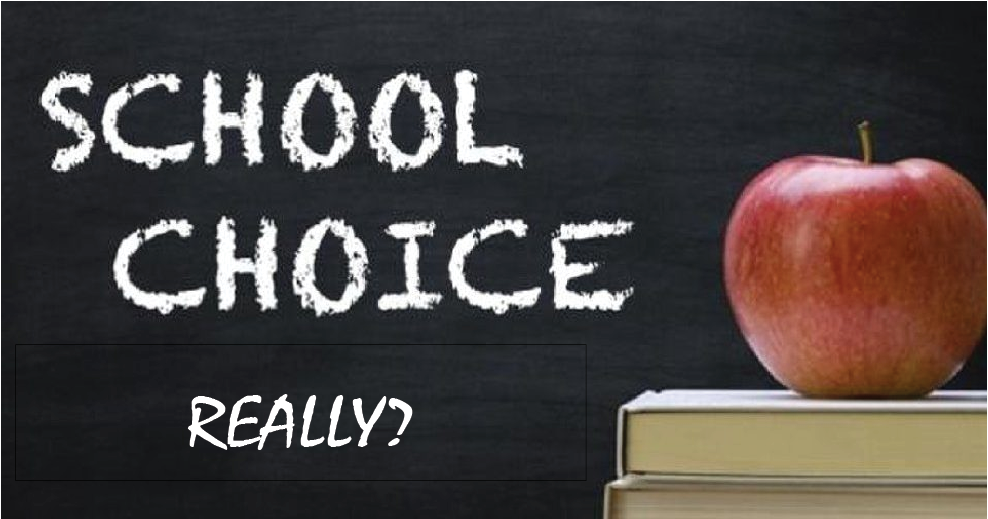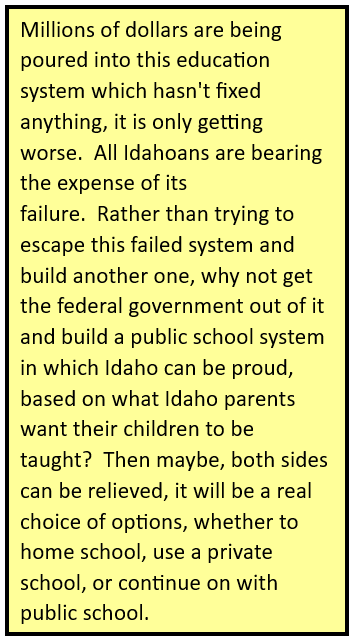
Education Freedom
By Karen Schumacher
The new Education Freedom Bill, which has garnered a fair amount of support and opposition, has passed the Senate Education Committee with a do pass recommendation. S1038 would essentially create an Education Savings Account (ESA) of roughly $6,000 per child, giving the parent more options in choosing an educational setting for their child, K-12th grade.
 Put aside the groups that are slinging arrows at each other as to whether or not to support or oppose this bill, as both sides are being backed by more powerful groups on their positions. Throwing mud at each other serves no purpose and obfuscates the need for Idahoans to understand the bill. The true reason this bill even emerged is because of the sorry state our school system has become. Public schools have become a factory of indoctrination on social issues, dismissing of parental rights, and how students are even educated is a serious question. For parents who have chosen to either home school or even put their children in private school, those public-school issues are serious enough for them to protect their children by removing them. It is very understandable why both sides want to maintain control, parents over their children, schools and teachers over the education system.
Put aside the groups that are slinging arrows at each other as to whether or not to support or oppose this bill, as both sides are being backed by more powerful groups on their positions. Throwing mud at each other serves no purpose and obfuscates the need for Idahoans to understand the bill. The true reason this bill even emerged is because of the sorry state our school system has become. Public schools have become a factory of indoctrination on social issues, dismissing of parental rights, and how students are even educated is a serious question. For parents who have chosen to either home school or even put their children in private school, those public-school issues are serious enough for them to protect their children by removing them. It is very understandable why both sides want to maintain control, parents over their children, schools and teachers over the education system.
Basically the bill takes the money that was going to the school and instead keeps it aside, called an Education Savings Account (ESA), for a parent who wants to use it for an alternative education, such as home schooling or private school. The money is held by the state, and through a digital platform parents and educators who want to be part of the system can apply. Either through the Treasurer’s office or independent contractor, the state would send the money to the educator designated by the parent. If the private school doesn’t provide a certain type of education, say for a special need, the parent can obtain that from a public-school source and the state will designate the money to the public school to cover the cost.
CONCERNS
There is some legitimate concern about the way this proposed system is run. While the bill provides for frequent monitoring to ensure the money is being spent appropriately by the parent, and return of the money to the state when no longer used for a private education, this back and forth management does cause some concern about the logistics. There are also the privacy concerns and ongoing threats of cyber-attacks. If a fraud case by the parent or educator does happen it will be assigned to the Attorney General office which brings the question of burdening that office.
Certain curriculum subjects are required but it isn’t clear how that will be monitored, or whose responsibility it will be. It was stated that the parent will be accountable for their children being taught whereas it was also pointed out the public school system has accountability systems in place to ensure the child is being educated properly. It seems both accountability stances have issues and problems.
There is an upfront cost to start this program and as the program could potentially grow the legislature would allocate the money for it each year, but there would be a cap that could not be exceeded. Similar programs in other states were used as examples of how a program such as this could save money and improve education outcomes. However, if the program was to expand it would also mean an expansion of the government role to administer it.
One of the biggest concerns about having the state run a program such as this is the potential intrusion of government regulations, especially by the federal government, this having occurred in other states. As long as federal money is not used for this program there would be no influence with federal regulations. However, while there are protections within the bill that prevent this from happening, the question does remain, what happens with it in the future with other legislators? The bill can certainly be amended by future legislators and once that door to the government is opened, neither parents who home school or private schools will be protected from it.
This is a serious and legitimate concern as a driving force behind creating this type of program has been the strangling effect federal government regulations have on public schools. Given the tyrannical federal government we are currently under, there is no reason to believe that this could not happen. Families who home school their children have concerns that they too will be forced into government regulations just as Idaho governs charter schools.
NON-PUBLIC IDAHO SCHOOLS TODAY
Right now there are about “142 private schools serving 17,897 students in Idaho” with “6% of all K-12 students” educated in these settings. 65% are religiously affiliated and with the repeal of the Blaine Amendment, the objections to tax dollars going to a religion based school will be negated, along with the money actually being provided to the parent and their choice in using it for the child’s education and not to a school.
THE UNITED NATIONS?
But there is a more looming threat to spending these dollars on private schools. One of the top rated private schools in Idaho is an International Baccalaureate World School (IB), along with three others that are part of the Idaho Public Charter School Commission. International Baccalaureate schools originate out of the United Nations International School (UNIS) organization, teaching kids from age 3-19. Do Idahoans want their tax dollar going to a United Nations program?
CORPORATIONS?
While concern was expressed about private schools being run by religious organizations, there should be more concern about the corporate world running in with a network of schools. Corporations have already scored high profits from public education through technology. Aside from the previously mentioned charter schools, there is the possibility of for profit corporations moving in to build schools as happened in Michigan. There are quite a few charter schools in Idaho but it isn’t known how many are connected to any profit making machines. But the potential is there. As happened in Michigan, it might bring in more regulatory action by the state if it does occur. That is the last thing that should happen in Idaho and protecting private schools from profit making corporations should be addressed. But that raises the dilemma, can the state deny a private school’s right to be funded and run by a large or global corporation?
THE WEF’S INTERESTS?
In fact, the World Economic Forum is already eyeballing private education for an investment opportunity. It wants more access to early education and it might just be easier with more private schools and cumbersome government schools out of the way. Perhaps seeing the burden early childhood education may place on the public school system, the way to go is to build the infrastructure for it through corporate influence. This is a real risk, especially if government funding will make it more available for families to use.
CONCLUSION:
There are no easy answers, both sides of the argument have reasonable concerns even though some of the arguments aren’t fully accurate on either side. However, the real problem is not being addressed, nothing is being done about the way in which the public school system has been manipulated into a poorly functioning entity, and rather than fix it, other options are being sought. Millions of dollars are being poured into this education system which hasn’t fixed anything, it is only getting worse. All Idahoans are bearing the expense of its failure. Rather than trying to escape this failed system and build another one, why not get the federal government out of it and build a public school system in which Idaho can be proud, based on what Idaho parents want their children to be taught? Then maybe, both sides can be relieved, it will be a real choice of options, whether to home school, use a private school, or continue on with public school.